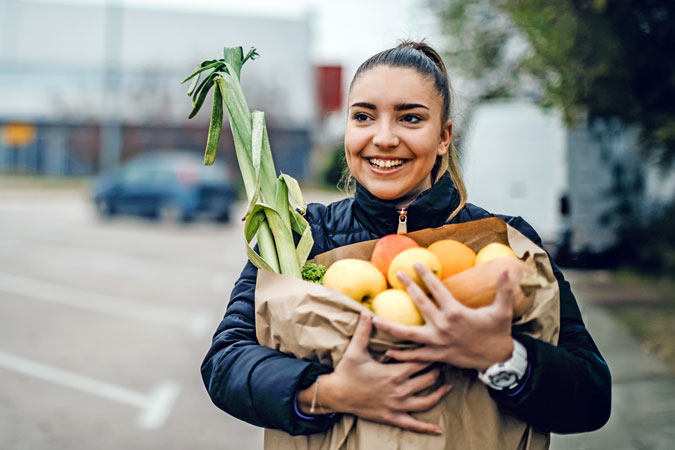Pulses and cancer
Find out about pulses, beans, lentils and other legumes and explore the evidence about pulses and cancer.

On this page
What are pulses?
Pulses are dried, edible seeds from legume plants. They grow in pods and vary in shape, size and colour. They include beans (like kidney beans, black beans and soya beans), peas (like chickpeas) and lentils.
Pulses are an affordable way to add protein and fibre to your diet and are a good plant-based alternative to chicken, turkey, fish and red meat. Pulses also provide a range of vitamins and minerals like iron, potassium and folate, while being low in saturated fat.
Pulses also contribute to your 5 A DAY. An 80g portion counts as one of your 5 A DAY, however, if you eat more, it still only counts as one portion.
> Find out what else counts in our 5 A DAY portion poster
What’s the link between pulses and cancer?
Pulses are high in fibre, and we have strong scientific evidence that eating high-fibre foods can reduce the risk of bowel cancer, as well as helping to reduce the risk of weight gain, overweight and obesity which can help protect against at least 13 types of cancer.
That’s why as part of our Cancer Prevention Recommendations, we recommend that people make pulses, fruit, vegetables and wholegrains (like brown rice) a major part of the daily diet.
What’s the science behind pulses and cancer?
Pulses contain many nutrients like fibre, vitamins, minerals and phytochemicals (natural chemicals in plant foods) that in combination may be responsible for reducing the risk of some cancers.
These factors, and especially because of their fibre content, is why pulses can help reduce your cancer risk.
In the UK, it is recommended to eat 30g of fibre every day.
Tips to eat more pulses
- Swap out some or all the meat in dishes like Bolognese, chilli, soups, stews and curries with pulses such as lentils, chickpeas, kidney beans or black beans.
- Add a handful of beans or lentils to salads, wraps and sandwiches for lunch.
- Make your own houmous or other dips like red lentil or broad bean dip to enjoy with vegetable sticks or wholemeal pitta bread as a snack.
Tinned pulses are budget-friendly and convenient since they’re already cooked but remember to choose ones that have no added salt or sugar, and rinse well before using. You can also buy them dried – just soak them overnight before using them in your cooking.
Did you know that tofu and tempeh are made from soya beans? You can also include these in stir-fries, curries and wraps.
Living with cancer
After a cancer diagnosis: follow our Recommendations, if you can.
Pulses can provide your body with a range of beneficial nutrients. However, if you are planning on making changes to your diet, you should always speak to your cancer care team first.
This is to ensure that any changes you make provide your body with enough energy (calories), protein, vitamins and minerals to support recovery.
What about soya beans and breast cancer?
Soya beans and soya foods like tofu contain phyto-oestrogens which has a similar structure to the human hormone oestrogen but works differently in the body.
People worry that phyto-oestrogens in soy may increase cancer risk, especially because oestrogen is a risk factor for breast cancer. However, our research shows that soy does not increase the risk of any cancer and may offer some benefits.
A review we funded also found some evidence that soya foods may reduce the risk of death and breast cancer recurrence – although more research is needed to confirm this.
Therefore, there’s no need for people, including cancer patients, to avoid foods like soya beans and soya foods. Eating soybeans can form part of a healthy diet and also contributes to your 5 A DAY. Soya is also a good source of plant protein, which is important for cancer patients to help prevent muscle loss.
> Read our blog: Could soy products affect my risk of cancer?
> For breast cancer patients: should I avoid soy if I have breast cancer?

Are you making yourself attractive to cancer?
Find out how to reduce your risk of cancer by taking our Cancer Health Check
Further research
Our 2018 Diet and Cancer Report did not look specifically at pulses. However, it did look at:
- wholegrains, vegetables and fruit
- body fatness and weight gain
It found strong evidence that:
- wholegrains DECREASE the risk of colorectal cancer
- foods containing dietary fibre DECREASE the risk of colorectal cancer
- foods containing dietary fibre DECREASES the risk of weight gain, overweight and obesity
> Read the relevant chapters in our Science and policy library
